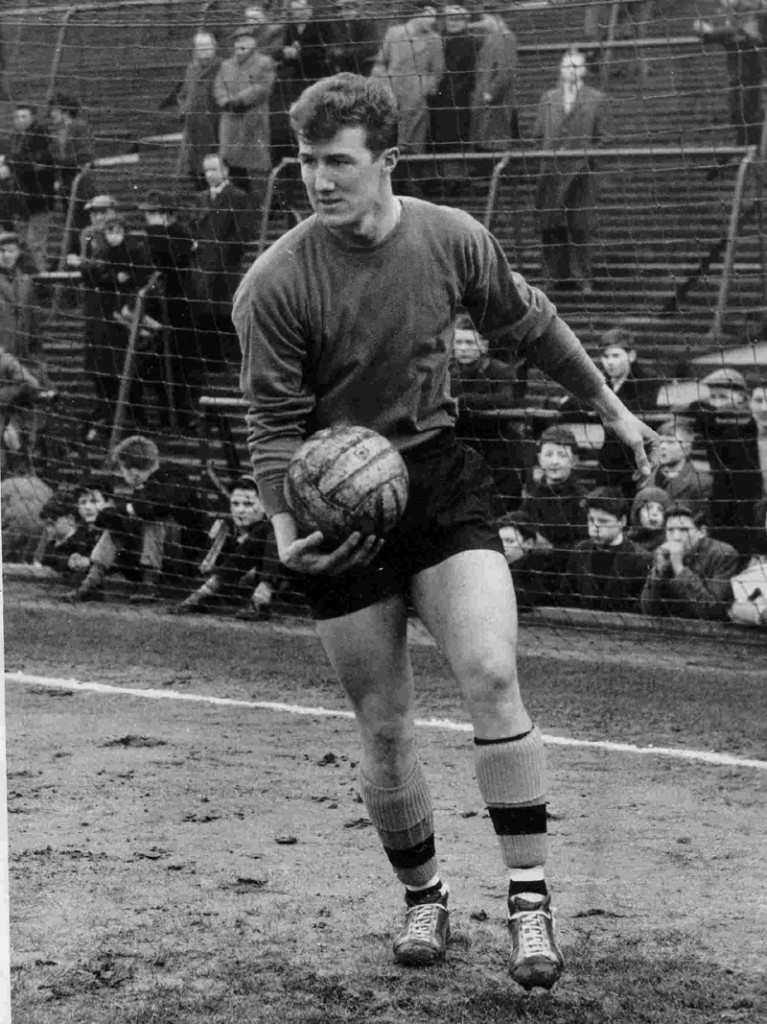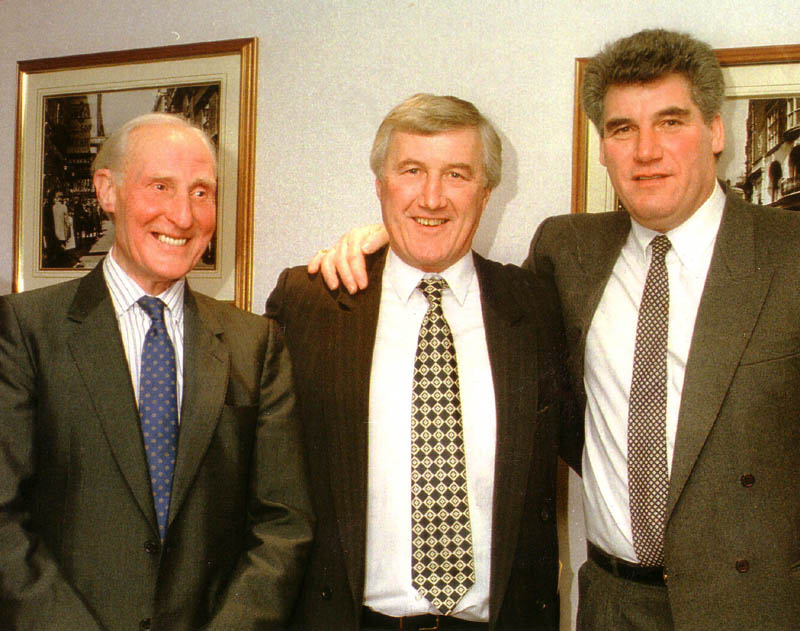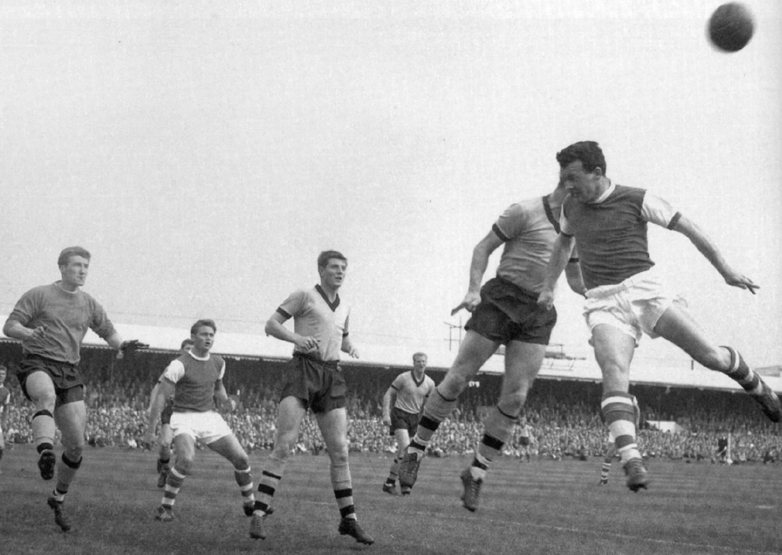With A Teacher Like Bert, How Could He Fail?

Taking over from Malcolm Finlayson was one thing; being called ‘The Young Cat’ around Molineux ramped up the pressure even more.
But there was enough in the friendship and working relationship between Fred Davies and Bert Williams to encourage comparisons – and for a virtual guarantee of career progression.
We can easily imagine the senior man’s pride at seeing his protégé, if that’s not too strong a word, develop into a keeper who played 173 League and cup games for the club.
Most of those were in the First Division and there were post-Wolves stints at Cardiff and Bournemouth, followed by a lengthy career in the dug-out, so we have lost a proper football man with his passing-away this week, at 81.
This has become a very tough time for fans of a certain age, with the deaths of Gerry Harris and Harry Hooper being announced as well since late July; three precious links with the club’s halcyon seasons broken.
Davies’s pathway was similar to Harris’s in as much as Wolves caught him early – but also akin to Hooper’s in that he was born out of the area and impressed while playing elsewhere.
When we remind ourselves that the long-time no 1 was born a mile from Liverpool city centre (and a week and a bit before the Second World War broke out), it is surprising that his traces of Scouse accent weren’t a full-blown characteristic.
Everton were his team when growing up and, having once played as a forward in a local cup final at Goodison Park, he wrote to the club at the age of 15 requesting a trial. He was given a game – in goal – but heard nothing after it.
He subsequently joined Borough United and was spotted in his mid-teens by Wolves’ scout in the area, former Liverpool and Chelsea winger Alf Hanson. Stan Cullis sent a £50 donation to the Llandudno-based club as a sign of the Molineux gratitude and promised them another £50 if the youngster did well. We assume that was handed over some time before Borough took a scalp in Europe in 1963 after winning the Welsh Cup, Fred having become a Wolves first-teamer by then.
Signing day in the presence of his parents and Stan Cullis had come in April, 1957 but the fact he was already 17 ruled him out of contention for the famous FA Youth Cup run the following season.
In an attempt to get him used to the club and his digs, Cullis ordered him to work on the ground in his first summer – no problem for a lad who had shown his industrious side by joining a glass-cutting firm at 15 and then moving to a company making trailers for vehicles.
He was initially very homesick but football’s restart helped and he graduated from sixth-choice to a place in the fourth team in the Worcestershire Combination. Then came the first of the meetings with his mentor.
Unlike Bradley-born England legend Williams, who was a first-team Walsall keeper when transferred across the patch, Davies was near the bottom of the pile and working his way up. But he clearly had something about him and was street-wise beyond his years.
“I went to Bert’s sports shop (in Bilston) and asked his advice….would he look at me?” Davies told Charles Bamforth for the excellent In Keeping With Wolves book in 1992.
“Bert came to Castlecroft and did just that. Our friendship built up. In the afternoons, after training, I would work in his shop, drive his van, do anything to help.

“Then, every Monday, he would pick me up from Molineux with a bag of balls and off we’d go to Castlecroft. The help and guidance he gave me were invaluable. He’d watch me in matches and, afterwards, we’d analyse what I’d done and how I might have done things differently.”
The results of the link-up were highly rewarding. Davies, having befriended fellow Merseysider Ron Atkinson during his national service, was promoted to Wolves’ reserve side around the time the club reached the 1960 Cup Final.
Even then, though, the wait for the ultimate step was lengthy. Finlayson, another who had shown for years that he was prepared to get his hands dirty away from football, had Geoff Sidebottom and, briefly, Chic Brodie as his deputies for the next season and a half.
Then a 7-2 League mauling at Blackpool proved a tipping point and Davies, Bobby Thomson and Freddie Goodwin were all blooded in the FA Cup clash with Albion the following Saturday.
Despite that 2-1 Molineux defeat in front of 46,000, the keeper jersey remained in fresh hands for the next seven games, continuing with a League debut victory at home to Tottenham witnessed by a similar-sized crowd. There was another five-game run at the end of the 1961-62 campaign after Finlayson had returned for a fortnight in the spring.
With the mould broken, Davies played 42 games out of 43 the following season and 35 the one after that as Wolves finished fifth in the table. He was effectively only their third regular first-pick keeper since the war.
If some players were privately pleased when the change of manager came in the autumn of 1964, the Liverpudlian wasn’t among them. His decision to make wedding plans with fiancee Maureen was initially questioned by Cullis, who then showed his caring side by helping them find a semi at Penn – with Bobby Mason as a next-door neighbour.
More importantly than that, the two hit it off on the training ground and match days, Davies responding well to the well-documented disciplinary regime and developing a deep trust in the man who had the power to make or break him.
Sadly, he didn’t find the same connection with Cullis’s successors. Being dropped at short notice by Andy Beattie after the signing of Dave Maclaren stuck in his craw and Charles Bamforth’s book also reveals an awkward set-to with Ronnie Allen and John Ireland amid the unequivocal statement: ‘Allen didn’t rate me’.
On top of that judgement, Phil Parkes was coming through and such is football’s evolution that the young man took over for the final third of the promotion-winning season.

Davies, who had refused a set-up move to Swindon, went to America for the long and triumphant summer tournament of 1967 and achieved ‘goalscoring goalkeeper’ status there by playing up front in one game and netting – a feat he repeated back home in a reserve game against Bury.
This turning back of the clock to his younger attacking days did not significantly extend a Wolves career which brought two final top-flight appearances and then a £12,000 move to Second Division Cardiff.
Fred loved his time at Ninian Park, where three Welsh Cup triumphs brought him a significant taste of Europe, and was disappointed to be considered too old by them at 31.
But the resulting move to Bournemouth meant working at close quarters with John Bond and such was the impact of that association that he followed him to Norwich as reserve and goalkeeper coach after a vertebra problem had ended his playing career.
Les Wilson, already a committed Davies fan, was at Carrow Road to appreciate the new string his former Wolves team-mate was adding to his bow, in particular how self-motivated and supportive he was. Spells at Bournemouth (again), Blackpool and as manager of Merthyr followed before Bond, having failed to take him to Manchester City and Burnley, recruited him as part of his Swansea backroom team.
The Midlands hadn’t seen the last of Davies, though, and he linked up yet again with Bond at both Birmingham and Shrewsbury, becoming a Fourth Division promotion winner at the latter after becoming manager outright.
Between and among assignments, he also expanded his network by working at Lilleshall with goalkeeping luminaries such as Gordon Banks, Alan Hodgkinson, Mike Kelly and John Osborne. He was a coach of real substance.

He happily remained resident in the Telford area into retirement, attending a Wolves v Bournemouth game a year and a half ago and showing at Wrottesley Park on one of his occasional golf appearances among Wolves friends that he could hit a long ball.
Fred’s enduring and varied career – hard to believe he ever had a CV! – shows he would turn his hand to all sorts. When I was despatched by the Express & Star sports editor to check a tip-off that Bond had been sacked at St Andrew’s, there was his loyal assistant painting an outside door to keep himself useful in the close-season sun.
He was more serious than footballers often are but hugely dedicated and an obvious thinker on the game. Just look what he achieved…..what a career, what a life!
